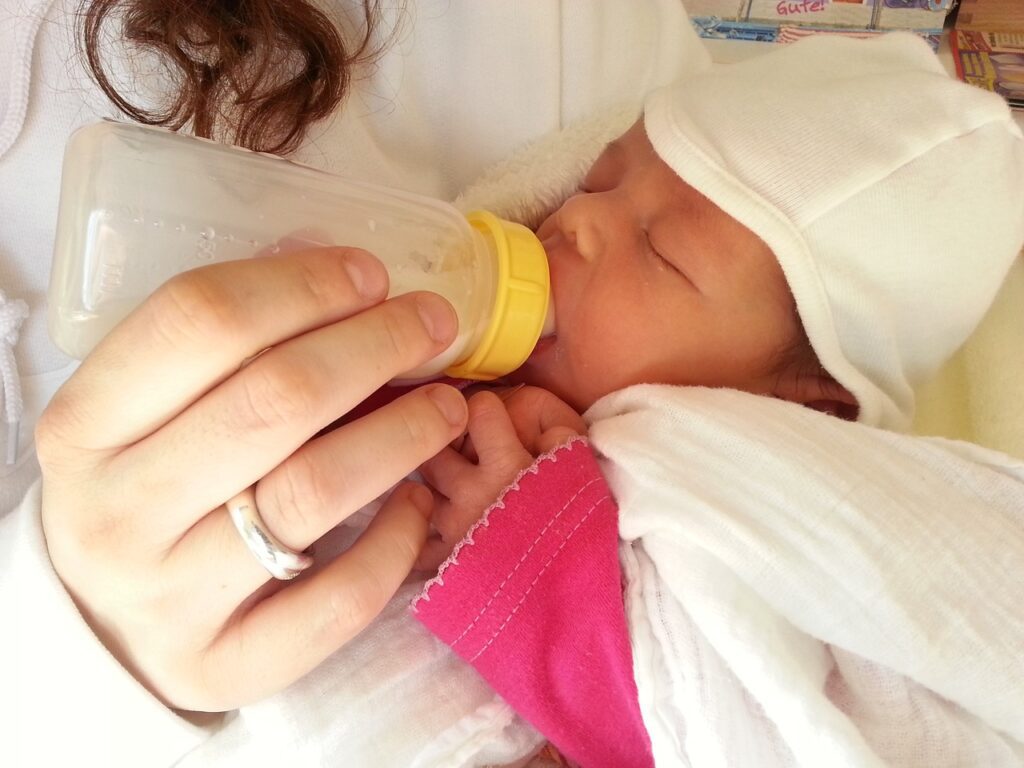Introduction
Congratulations on your little bundle of joy! As a new parent, you may feel overwhelmed or unsure about how to navigate the world of feeding your newborn. Don’t worry, though; we’re here to help! In this post, we will share valuable tips and tricks to make feeding time a breeze for you and your baby. From bottle-feeding to bottle-feeding, we’ve got you plenty of helpful information and practical advice.
feeding Basics
Breathing is a natural way to nourish a baby. Here are some essential tips to get you:
- Positioning: Find a position for both you and your baby. Ensure your baby’s head and body are aligned, and their mouth is directly facing your nipple. Many moms find the “cradle hold” or the “football hold” positions comfortable.
- Latch-on: A proper latch is key to successful breastfeeding. Ensure that your infant’s mouth encompasses the entire areola, rather than just the nipple. This will ensure they get enough milk and prevent nipple soreness.
- Frequency and duration: Newborns have tiny tummies, so they need to be fed frequently, usually 8–12 times a day. The duration of each feeding session can vary, but on average, it’s around 15-20 minutes per breast.
- In-demand feeding: Breastfed babies feed on demand rather than on a strict schedule. Watch for hunger cues like rooting, sucking motions, and turning their heads. Respond promptly, and feed your baby whenever they show signs of hunger.
- Breast care: Take care of your breasts by keeping them clean and dry. Use warm compresses or nipple creams if you experience soreness or cracked nipples. Consult a lactation consultant if you have any concerns or difficulties.

Bottle-Feeding Basics
If you choose to bottle-feed your baby, here are some essential tips to ensure a smooth experience:
- Choosing the right formula: There are various formula options available, such as cow’s milk-based, soy-based, or hypoallergenic formulas. Consult your pediatrician to determine which one suits your baby’s needs.
- Sterilization: It’s crucial to maintain proper hygiene while bottle-feeding. Sterilize bottles, nipples, and other feeding equipment before each use to eliminate bacteria and prevent infections.
- Feeding schedule: Unlike breastfeeding, bottle-feeding allows you to establish a more structured feeding schedule. Aim to feed your baby every 2–3 hours, adjusting as per their needs and hunger cues.
- Preparation and storage: Follow the instructions on the formula packaging to prepare the formula accurately. Ensure the water is boiled and cooled before mixing. If you need to prepare bottles in advance, store them in the refrigerator and warm them before feeding.
- Bonding time: Bottle-feeding offers an excellent opportunity for bonding with your baby. Maintain eye contact, cuddle them close, and enjoy the precious moments of closeness during feedings.
Coping with Common Challenges
Feeding a newborn comes with its fair share of challenges. Here are some common difficulties and how to overcome them:
Breastfeeding challenges:
- Low milk supply: It’s common for new moms to worry about their milk supply. Make sure you’re drinking plenty of fluids, getting enough rest, and eating a well-balanced diet. Consider speaking to a lactation consultant for additional support and guidance.
- Engorgement: Engorgement occurs when the breasts become swollen and uncomfortable due to increased milk production. Applying warm compresses and expressing a little milk before feeding can relieve the discomfort and make latching easier for your baby.
Bottle-feeding challenges:
- Colic and reflux: Some babies experience colic or reflux, causing them to be fussy during or after feedings. Try holding your baby upright during and after feedings, burping them regularly, and using anti-colic bottles if necessary. Consult your pediatrician for further guidance.
- Nipple confusion: If you plan to both breastfeed and bottle-feed, be aware of nipple confusion. Introduce bottle-feeding after breastfeeding is well-established to minimize the risk of your baby preferring the bottle over the breast.

Seeking Support and Guidance
Remember, you’re not alone in this journey. Reach out for support and guidance whenever you need it:
- Lactation consultants: Trained experts with a focus on supporting breastfeeding are known as lactation consultants. They can provide personalized guidance, address any concerns, and help you overcome breastfeeding challenges.
- Parenting groups: Join local parenting groups or online communities where you can connect with other parents going through similar experiences. Hearing from others can provide valuable insights, tips, and emotional support.
- Pediatrician: Your baby’s pediatrician is a reliable source of information and guidance regarding feeding and overall infant care. Schedule regular check-ups, and don’t hesitate to ask questions or seek clarification.
Conclusion
Feeding your newborn is a beautiful and essential part of your parenting journey. Whether you choose to breastfeed or bottle-feed, it’s important to find what works best for you and your baby. Remember to stay flexible, seek support when needed, and trust your instincts. Cherish these precious moments of bonding and nourishing your little one; they grow up so quickly!
Also Read Taking Care of Your Baby: Practical Advice

